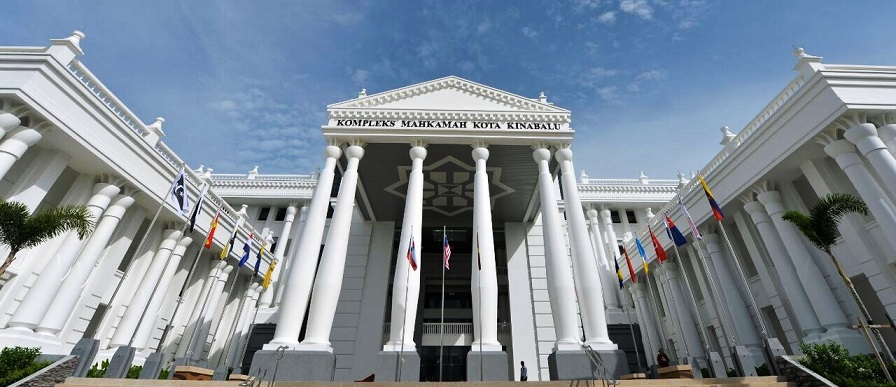
Dr Reuben Nilus presentating a souvenir to Dr Arthur Chung (third from right) representing the Chief Conservator of Forests.
KOTA KINABALU (Nov 26): The potential impact of the Pan Borneo Highway, which cuts through Ruku Ruku Valley, an ecologically sensitive area within Tawai Forest Reserve, was highlighted at the seminar on Tawai Forest Reserve, “Defining Tawai: Ecological Integrity Meets Social Values.”
The highway is expected to fragment wildlife habitats, posing significant risks to species that depend on large, contiguous landscapes, such as the Bornean Elephant and the critically endangered Bornean Peacock Pheasant. Habitat fragmentation may lead to increased human-wildlife conflicts, disrupt wildlife corridors, and diminish the genetic diversity of species in the reserve. Other threats include encroachment and the expansion of plantations, which further exacerbate habitat degradation.
Nearly 200 attendees, including lecturers from universities, representatives from NGOs, government agency officials, and students attended the seminar held at the Le Meridien Hotel.
The seminar emphasised the importance of balancing development with conservation priorities. Recommendations included monitoring land use changes, increasing conservation efforts, and promoting community-led initiatives to mitigate the impact of infrastructure projects like the Pan Borneo Highway. It highlighted the Tawai Forest Reserve’s role as a cornerstone of Sabah’s natural heritage, providing critical ecosystem services while supporting biodiversity and local livelihoods.
The discussions underscored the need to integrate science, remote sensing technology, and traditional knowledge to enhance conservation and sustainable management. These findings serve as a call to action and a reminder of the shared responsibility to preserve the Tawai Forest Reserve for future generations.
Moving forward, collaboration among government agencies, researchers, local communities, and conservation organisations will ensure this threatened reserve remains a thriving ecosystem and a source of life for Sabah’s people.
Organised by the Sabah Forestry Department (SFD) through Forest Research Centre, the seminar featured speakers from SFD, the Community Elephant Ranger Team Telupid (CERT) and Seratu Aatai, who shared critical insights into the vital ecosystem services and wildlife movement in Tawai Forest Reserve.
Serving as a platform to unveil initial findings from a groundbreaking project on the Tawai Forest Reserve led by Dr Reuben Nilus and Julsun Sikui of the Forest Research Centre, the seminar featured presentations on topics such as land cover dynamics, soil assessment, water quality, forest ecosystems, flora and fauna biodiversity, and social surveys exploring community perceptions on ecosystem services.
A special highlight was the application of UAV LiDAR technology, a laser-based scanning tool used to measure the dimensions of Tawai Waterfall, showcasing the integration of advanced technology with conservation research.
Furthermore, local communities were emphasised as central to the project, providing traditional knowledge and insights that complement scientific data.
As pointed out by the Chief Conservator of Forests, Datuk Frederick Kugan, in the opening speech, “It’s crucial to involve the local communities who depend on these ecosystems, so they can directly benefit from and contribute to the conservation efforts”.
His speech was delivered by his deputy (R&D), Dr Arthur Chung.
Recent research presented at the seminar highlighted Tawai Forest Reserve as a vital ecosystem provider, contributing significantly as habitats for flora and fauna, clean water resources, and provision for local livelihoods. Using remote sensing technologies, researchers mapped the reserve’s land cover, revealing that 80% is forested. However, 36% of the area comprises steep, sensitive slopes critical for conservation. The soils are slightly acidic, low in plant nutrients and soil carbon, reflecting the harsh condition of ultramafic soils. Fortunately, water quality tests across four rivers classified them as Class I, confirming the reserve’s role as a vital water catchment area.
Biodiversity surveys revealed 1,296 plant species, including 147 endemics to Borneo and 51 listed on the IUCN Red List. Wildlife studies recorded 18 frog species, 68 bird species — including the endangered Bornean Peacock Pheasant —and several endemic insects, reaffirming the reserve’s status as a biodiversity hotspot. Furthermore, the reserve offers significant ecotourism potential with attractions such as Tawai Waterfall, Tawai 4 Peaks and Tawai Rainforest Camp (TRC).





